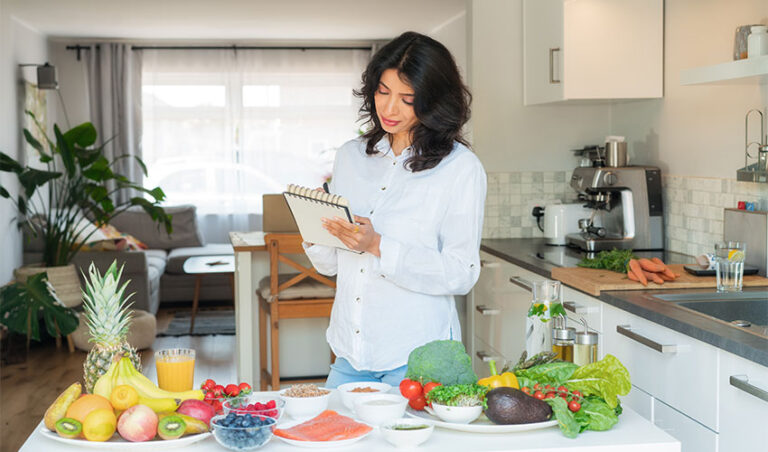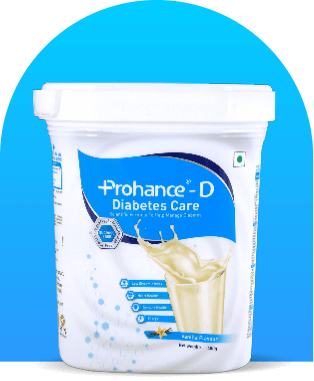
Diabetes mellitus or type 2 diabetes is a chronic condition that affects nearly 101 million Indians as per a study conducted in 2021. Diet plan for diabetic patient in India plays a crucial role in managing this condition. India is a country of many flavours and Indian food plays an important social role as well. This makes it important for Indians with diabetes to pay attention to what they consume and have a tailored diet plan that they can sustain for long.
In this blog, we have curated some of the best Indian meal ideas for diabetes management for those who are looking for a balanced Indian diet for diabetes. You can find examples of sugar-free desi meals to include in your regular diet and how to personalise your own diet plan to eat Indian food for blood sugar control.
Diabetes is a medical condition that causes an imbalance in the blood sugar levels either due to the body developing insulin resistance or due to reduced insulin production. Insulin helps the sugar enter cells for energy. This function is impaired in people with diabetes. Thus, blood sugar levels fluctuate and tend to increase greatly after consuming a meal rich with refined carbohydrates, for example. Higher-than-optimum blood sugar levels lead to long-term and often permanent damage bodily organs over time.
By having a suitable diet plan you can manage your blood sugar levels, prevent the complications of diabetes, and lead a relatively healthy life. Thus, what you eat, when you eat it, how you prepare the food, and everything else plays an important role in managing blood sugar levels.
Dietary restrictions necessary for managing diabetes combined with individual’s taste preferences may prevent people with diabetes from getting their daily essential macro- and micro-nutrients. Thus, creating a personalised meal plan for yourself is crucial to getting your daily dose of essential nutrients and maintain overall health.
Try the Nutrition Calculator to get detailed insight on your daily meal
Here are some suggestions for your diabetes diet plan breakfast edition:
Are your looking for some sugar-free Indian meal ideas? Listed below are some suggestions for lunch and dinner:
The following food items are excellent snack ideas for your diet plan
Here are some tips to help you create and manage an ideal Indian diabetic meal plan:
Portion Control: The quantity of food you eat as a diabetic is just as important as what you consume. This is because as you increase the amount of food in your diet, the amount of glucose in your blood after consumption increases as well; all food eventually turns to sugar and other nutrients in the end.
Consistent Mealtime: By consuming small, nutrient-rich portions of food throughout the day at regular intervals, people with diabetes can ensure they get their daily requirements of macro- and micro-nutrients without risking a blood sugar spike.
Whole Grains Supremacy: Prioritise consuming whole grains such as whole wheat, oats, bajra, jau, brown rice, and semolina or suji. Limit or avoid your intake of refined flour, white rice, etc. as they have simple carbohydrates and have a high glycaemic index.
Vegetables Extravaganza: Consuming vegetables like cauliflower, bottle gourd, spinach, bitter gourd, and others in your meal to get essential vitamins and minerals. Since these are rich in fibre as well, they promote digestive health and help manage blood sugar levels.
Zero Added Sugar: Some people with diabetes go as far as removing sugar, honey, and jaggery completely from their kitchen, especially if they live by themselves. This also means soft drinks, energy drinks, and other sugary beverages are a big no-no for diabetics.
Minimise Red Meat Consumption: Lean meats, such as fish and other seafood items, are low in saturated fats but prove to be an excellent source of protein as well. Eggs are also a high-quality protein that contains very low amounts of carbohydrates contrary to popular belief.
Low GI Fruits: Apple, strawberries, oranges, pears, plums, and other high-fibre fruits are an excellent inclusion for the diet of people with diabetes. Consuming 1-2 portions of seasonal fruits can help you get the daily required dose of vitamins and minerals without causing a blood sugar spike.
Including Healthy Fats: People with diabetes have a high chance of developing heart problems. Thus, you are recommended to include healthy fats in your diet to reduce inflammation and improve heart health.
Consult Now & get personalized guidance to improve your health and wellbeing
Now that you have a decent idea of what foods to eat for diabetes in India, here are some food items that you should avoid managing blood sugar levels:
High protein, no-added sugar, high protein, and whole grains are some of the features of the best Indian diabetic diet. Before you look for healthy Indian diet for diabetic patients, keep your personal taste preferences and availability of ingredients in mind as this diet change is supposed to be a lifestyle change for the better and not a short-term experiment. If you find it difficult to get your daily macro requirements with your current diet plan, we recommend supplementing your diet with health supplements like Prohance D. This protein powder for diabetics has a triple blend of protein, healthy fats, and other ingredients that help in managing your blood sugar levels in addition to ensuring sustained energy supply throughout the day.
